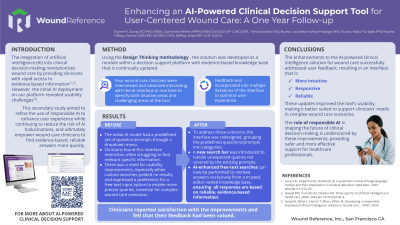Practice Innovations
(PI-038) Enhancing an Ai-powered Clinical Decision Support Tool for User-centered Wound Care: A One Year Follow Up
Friday, May 2, 2025
7:45 PM - 8:45 PM East Coast USA Time

Catherine Milne, MSN, APRN, ANP/ACNS-BC, CWOCN_AP, WOCNF; Tiffany Hamm, BSN, RN, ACHRN, CWS; Jeffrey Mize, RRT, CHT, CWC; Michael White, MD, UHM, MMM, CWS; Charlotte Hope Kwon, Cognitive Science Candidate – Intern - WoundReference, Inc., USC -Berkeley
Introduction:
Introduction: The integration of artificial intelligence (AI) into clinical decision-making can revolutionize wound care by providing wound care providers with rapid access to reliable, evidence-based information. However, there have been usability challenges in our previously reported deployment.1 This secondary study aimed to refine the use of responsible AI to enhance user experience while reducing the risk of AI hallucinations and empower wound care clinicians to find evidence-based, reliable answers more quickly.
Methods:
Methods: The initial AI model was limited to generating responses for a predefined set of question/prompts accessible through a dropdown menu. Clinicians found this interface restrictive, often struggling to find prompts relevant to their specific clinical queries. They emphasized the need for usability improvements and expressed a preference for a free-text input option to enable more precise queries that are essential for complex wound care scenarios.
The solution was developed as a module within a decision support platform* with a continuously updated evidence-based knowledge base. Clinicians were interviewed and observed interacting with the AI interface in real time to identify both intuitive areas and challenging areas of the tool. Feedback was incorporated into multiple iterations of the interface to optimize user experience. To address these concerns, the interface was redesigned, grouping the predefined questions/prompts into categories (e.g., “wound care,” “HBOT”). Additionally, a new search bar was introduced to manage unexpected queries not covered by the existing prompts.
Results:
Results: Clinicians can now perform AI-enhanced free-text searches, retrieving answers exclusively from a trusted, editor-vetted knowledge base, ensuring all responses are based on reliable, evidence-based information. This guarantees that the content is accurate and trustworthy. Following these enhancements, clinicians reported improved satisfaction and ease of use.
Discussion:
Discussion: User-centered wound care coupled with AI produces clinical intelligence, not artificial intelligence. Ongoing improvements using clinician feedback underscores the role of responsible AI in shaping the future of clinical decision-making, providing safer and more effective support for healthcare professionals.
Introduction: The integration of artificial intelligence (AI) into clinical decision-making can revolutionize wound care by providing wound care providers with rapid access to reliable, evidence-based information. However, there have been usability challenges in our previously reported deployment.1 This secondary study aimed to refine the use of responsible AI to enhance user experience while reducing the risk of AI hallucinations and empower wound care clinicians to find evidence-based, reliable answers more quickly.
Methods:
Methods: The initial AI model was limited to generating responses for a predefined set of question/prompts accessible through a dropdown menu. Clinicians found this interface restrictive, often struggling to find prompts relevant to their specific clinical queries. They emphasized the need for usability improvements and expressed a preference for a free-text input option to enable more precise queries that are essential for complex wound care scenarios.
The solution was developed as a module within a decision support platform* with a continuously updated evidence-based knowledge base. Clinicians were interviewed and observed interacting with the AI interface in real time to identify both intuitive areas and challenging areas of the tool. Feedback was incorporated into multiple iterations of the interface to optimize user experience. To address these concerns, the interface was redesigned, grouping the predefined questions/prompts into categories (e.g., “wound care,” “HBOT”). Additionally, a new search bar was introduced to manage unexpected queries not covered by the existing prompts.
Results:
Results: Clinicians can now perform AI-enhanced free-text searches, retrieving answers exclusively from a trusted, editor-vetted knowledge base, ensuring all responses are based on reliable, evidence-based information. This guarantees that the content is accurate and trustworthy. Following these enhancements, clinicians reported improved satisfaction and ease of use.
Discussion:
Discussion: User-centered wound care coupled with AI produces clinical intelligence, not artificial intelligence. Ongoing improvements using clinician feedback underscores the role of responsible AI in shaping the future of clinical decision-making, providing safer and more effective support for healthcare professionals.

.jpg)